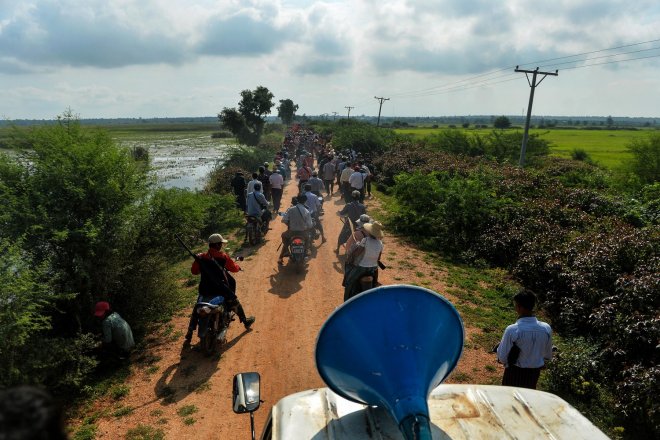
Myanmar’s junta is threatening stiff prison terms and even the death penalty under a law regulating weapons ownership that analysts say aims to instill fear in supporters of the armed resistance.
The new Weapons Law, enacted on May 11, comes at a time when armed resistance to the military government, which took over in a 2021 coup, is spreading throughout the country.
“It appears to have been released with the intention of targeting urban guerrillas,” said Saya Kyaung, a spokesman for the Yangon UG Association, a rebel group. “This is simply an attempt to try to weaken the revolution."
The law details restrictions on the right to bear, transfer and hold weapons, including the selling, production, distribution, import and export of firearms.
It states that a person who has purchased or is in possession of a weapon with an intent to commit treason – meaning fighting junta forces – can be sentenced to five to 10 years in prison.
It also states that stealing, destroying, selling or transferring state-owned weapons or the ammunition of government personnel is punishable by 10 years to life imprisonment, or a maximum penalty of a death sentence.
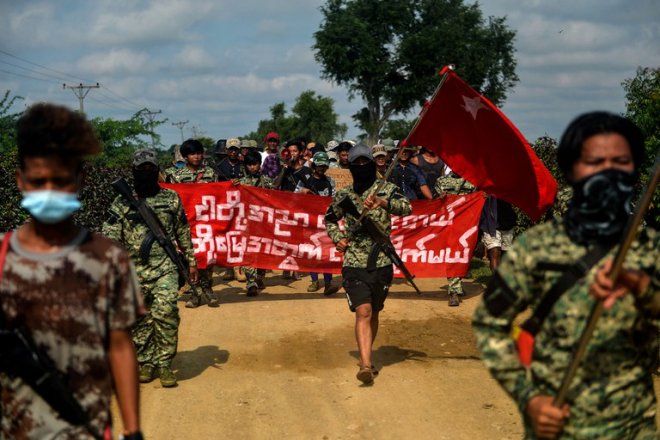 Anti-coup fighters escort an anti-junta street march in Sagaing Township Sept. 7, 2022. Armed with little more than homemade weapons and knowledge of the local terrain, some of these groups have surprised the military with their effectiveness. Credit: AFP
Anti-coup fighters escort an anti-junta street march in Sagaing Township Sept. 7, 2022. Armed with little more than homemade weapons and knowledge of the local terrain, some of these groups have surprised the military with their effectiveness. Credit: AFP
These two provisions are designed to prevent members of the junta’s armed forces from joining the anti-junta Civil Disobedience Movement or handing them weapons and ammunition, CDM officer Kaung Thu Win told Radio Free Asia.
Thein Tun Oo, executive director of the Thayninga Institute of Strategic Studies, which is made up of former Burmese military officers, said the law is aimed at curbing the illegal use of firearms – but it’s also aimed at retrieving weapons from People’s Defense Force fighters, he said.
“By enacting this new law, those who want to bear arms will be able to do it with the boundaries of the law,” he said. “This is the benefit. It will have controlled illegal weapons spread across the country, too.”
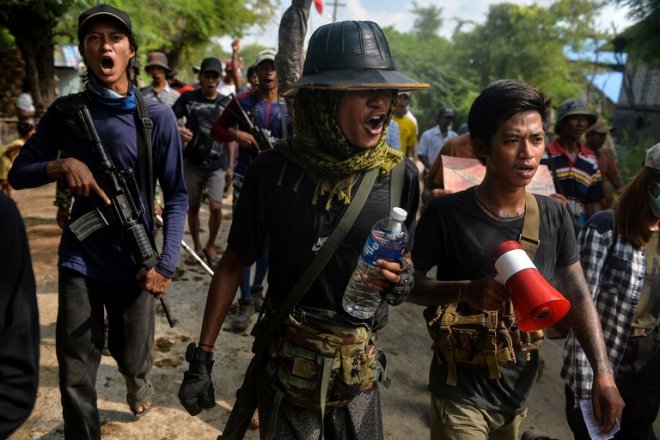 Anti-coup fighters escort an anti-junta street march in Sagaing Township Sept. 7, 2022. The new Weapons Law, comes at a time when armed resistance is spreading throughout the country. Credit: AFP
Anti-coup fighters escort an anti-junta street march in Sagaing Township Sept. 7, 2022. The new Weapons Law, comes at a time when armed resistance is spreading throughout the country. Credit: AFP
Facing the threat of the PDFs
Armed conflicts have taken place in 255 out of 330 townships in Myanmar, the annual report of the Office of the United Nations High Commissioner for Human Rights published on March 3 stated that in the two years since the military took power.
Earlier this month, the junta announced that people with illegal firearms can apply for licenses – including PDF members who could receive cash in exchange for their weapons.
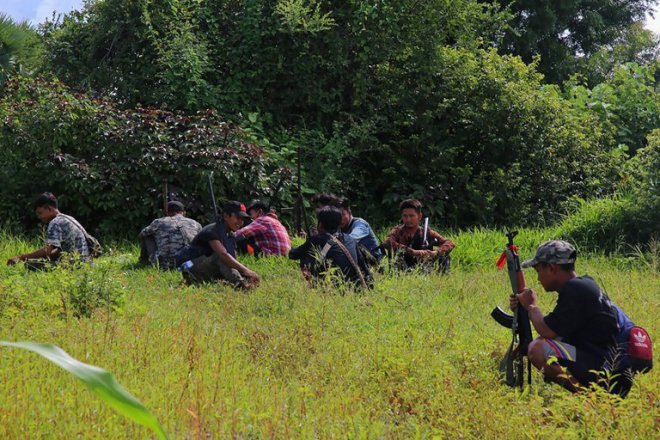 Anti-coup fighters with their weapons sitting in a field in northwestern Sagaing region, Aug. 10, 2022. The new weapons ownership law imposes restrictions on the right to bear, transfer and hold weapons, including the selling, production, distribution, import and export of firearms. Credit: AFP
Anti-coup fighters with their weapons sitting in a field in northwestern Sagaing region, Aug. 10, 2022. The new weapons ownership law imposes restrictions on the right to bear, transfer and hold weapons, including the selling, production, distribution, import and export of firearms. Credit: AFP
The junta is trying to arm those who support it and keep weapons out of the hands of the PDFs, said Than Soe Naing, a political analyst.
“The junta has been faced with two problems: One is that it needs to manufacture and equip weapons to its forces in order to reinforce them. But it is also facing the threat of those weapons getting in the possession of the revolutionary PDF forces,” he said.
That’s why the law is a threat to the people of Myanmar, said Kyaw Zaw, spokesman for the president’s office of the shadow National Unity Government.
“The military council itself is an illegal entity. Therefore, they have no right to enact any law in Myanmar,” he said. “Since they are a bunch of criminals, they have absolutely no legal authority to declare a law or enact it. That’s why I first want to say that the law they have created is entirely illegal which is just mainly designed to scare the people.”
Translated by Myo Min Aung. Edited by Matt Reed and Malcolm Foster.
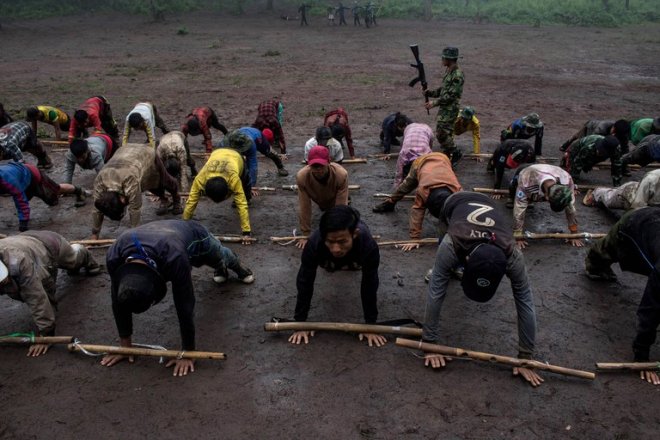 Members of the Karen National Defense Force train at their base camp in the forest near Demoso, in Myanmar’s eastern Kayah state on Oct. 16, 2022. Credit: AFP
Members of the Karen National Defense Force train at their base camp in the forest near Demoso, in Myanmar’s eastern Kayah state on Oct. 16, 2022. Credit: AFP